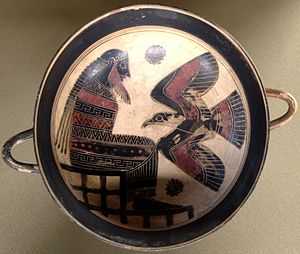Perioeci
| Sparta |
 Zeus on his throne with his eagle This article is part of the series: |
| Great Rhetra Laws of Lycurgus Politeia |
|---|
| List of Kings of Sparta Gerousia Ephorate Apella of the Damos Spartiates Perioeci Helots Agoge Syssitia |
|
Spartan army • Other Greek city-states • Law Portal |
The perioeci, or perioikoi, were the members of an autonomous group of free but non-citizen inhabitants of Sparta. Concentrated in the beach and highland areas of Laconia, the name περίοικοι derives from περί, peri, "around," and οἶκος, oikos, "dwelling, house." They were the only people allowed to travel to other cities, which the Spartans were not, unless given permission.
Origin
Achaeans who had been invaded by the Dorians — where the Achaeans of the plains became helots, the perioeci were also Dorians; however when the Dorians settled in Laconia there were five different groups of Dorians who rose to power. The Spartans rose to become the most powerful of these five colonies and defeated the others; the others then became the Perioeci. There was another theory that they were settled from Lacedaemon, thus being analogous to the Roman colonies; however, Messenia was one exception to this theory, and it became difficult over time to believe that Sparta could found hundreds of perioecid villages.
Status
Under the rule of Sparta, the perioeci belonged to the Lacedaemonian State, subject to the suzerainty of Sparta but not Spartan citizens. If their free status was not the object of controversy, the situation was unclear concerning the precise nature of their subject status within Sparta versus the status of allied cities and the strangers. In the same way, their political and social organization was quite poor.
Their territory, the perioikis (περιοικίς), formed part of their territory within Sparta itself. Their villages were described as poleis by Herodotus (VII, 234), Xenophon (Hellenica, VI, 5, 21) and Thucydides (V, 54, 1). It can be noted that their poleis acted as a sort of buffer around Sparta, shielding it from outside influence and to some extent to present a form wall to the helots; preventing escape and enforcing of Sparta's area of immediate control and watch. They were permitted to have some contact with outsiders and to trade.
The perioeci had the rights to own lands, and belonged to the civic army the same title as equals: they were hoplites in the army and epibastes in the navy. They could not participate in any political decisions and could not marry Spartan men or women.
See also
- Helots, non-free inhabitants of Sparta
- Metics, similar social class of Athens.
- Sciritae, distinct group of non-citizens of Sparta occupying a roughly equivalent social stratum
References
- Paul Cartledge, Sparta and Lakonia. A Regional History 1300 to 362 BC, Routledge, New York, 2002 (2nd edition) ISBN 0-415-26276-3
- Edmond Lévy, Sparte : histoire politique et sociale jusqu’à la conquête romaine (Sparta: Political and Social History until the Roman Conquest), Seuil, coll. "Points Histoire" (Points of History), Paris, 2003 ISBN 2-02-032453-9
- Finley, M.I. Ancient History, Evidence and Models, Chatto & Windus, (London 1985).
- Mathieu Aref, Grèce (Mycéniens=Pélasges) ou la solution d'une enigme (Greece (Mycenaeans=Pelasgians) Or A Solution To The Enigma) - Collection Mnemosyne (Mnemosyne Collection) - Paris 2004
- Andrey Zaykov. The Status of the Lakedaimonion perioikoi. Part I (In Russian + English summary: К вопросу о статусе лакедемонских периэков. Часть I). Published in: Issedon - ΙΣΣΕΔΩΝ: Almanac of Ancient History and Culture. Ekaterinburg: The Ural State University Press, 2003. Vol. 2. P. 16-44.
- Andrey Zaykov. The Status of the Lakedaimonion perioikoi. Part II. Published in: Issedon - ΙΣΣΕΔΩΝ: Almanac of Ancient History and Culture. — Ekaterinburg: The Ural State University Press, 2005. Vol. 3. P. 69-85.